The first public hearing for the 2019-2020 Miami-Dade budget Thursday was pretty uneventful. It passed 10-3 and there was very little protest. Most of the speakers simply want more money for affordable housing or some program.
Nothing really seemed dire.
Miami-Dade Mayor Carlos Gimenez must be doing the happy dance. He seems to have hoodwinked a majority of this commission with his shell game. Only Commissioners Joe Martinez, Xavier Suarez and Esteban Bovo voted against the budget because they do not agree with spending priorities.
Gimenez presented his penultimate budget — next year is his last in office — with the usual “I’m a hero” tone and switched gears on th e misused People’s Transportation Plan funds, actually — no joke — justifying the continued use of the half penny tax for transit operations and maintenance.
e misused People’s Transportation Plan funds, actually — no joke — justifying the continued use of the half penny tax for transit operations and maintenance.
He started the way he always does — by reminding us about the 12% tax cut he made his first year in office. “The largest in county history,” he boasts.
Read related: Affordable housing tops issues at 1st Miami-Dade budget hearing
“By reducing the overall tax rate by 12 percent, we have saved taxpayers almost $2 billion — which is equivalent to ore than $1,700 for the average household,” Gimenez said, forgetting that everyone pays more taxes because the property values have risen.
“We were able to do this because we have been committed to using taxpayer dollars as effectively and effici ently as possible,” he said, forgetting perhaps that he closed libraries, left police vacancies open and shut down fire rescue units for hours at a time because of the budget cuts that followed for years.
ently as possible,” he said, forgetting perhaps that he closed libraries, left police vacancies open and shut down fire rescue units for hours at a time because of the budget cuts that followed for years.
By keeping a flat tax rate, Gimenez has had access to billions of additional dollars over the last nine years, monies he has helped usher into the pockets of his friends and family and fundraisers with juicy jobs and no-bid contracts.
How efficient and effective is it to have Ralph Garcia Toledo making $200 an hour for what amounts to basically a clerical job that any one of the county’s 27,000 employees can do?
Read related: Mayor’s pal gets more of the millions doled out Tuesday
But, if you hear him tell it, Gimenez is our savior and protector.
“Local government serves many different roles, but the most important thing we do is protect our community,” Gimenez said. “Every day, our employees 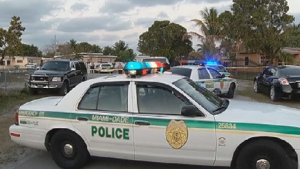 protect our residents from crime, from environmental damage, from fires and other emergencies.
protect our residents from crime, from environmental damage, from fires and other emergencies.
“We provide safe roads, bridges and public transportation, clean water and solid waste disposal,” he said.
“We enforce building codes, protect shorelines from beach erosion, keep pets and domesticated animals safe and support our most vulnerable residents with health services, food distribution programs and employment assistance.
After talking far too long about how wonderfully our county staff prepared for Hurricane Dorian and responded to the need in the Bahamas afterwards — as expected — Gimenez listed the golden nuggets in the $9 billion budget that he said had no service reductions (because, we know, that comes later) or layoffs despite a flat tax rate (because, we know, an increase in property values will bring in hundreds of millions more).
There are increases in water and sewer fees, Gimenez said, to support system infrastructure. But no increase in bus fares or MetroRail fares. Deputy Mayor Jennifer Glazier Moon explained that the water fee increases are based on a tiered system so that the people who use less water, mostly those on fixed  income or in low-income areas, would not be overburdened.
income or in low-income areas, would not be overburdened.
“Recently, we have seen what can happen if we postpone needed maintenance of our system,” Gimenez said, referring to the leak that poured thousands of gallons of wastewater into the Oleta River last month. “It is also important that you understand the impacts of postponing the elements of our capital plan required by the federal consent decree.
“A 12-month delay in the capital plan is anticipated to cause the application of liquidated damages and state and federal penalties that could cost twice as much as the revenue that would be generated by the recommended increase.
“Said a different way, if this increase is not approved this year, an increase of three times as much could be needed next year. It is much more prudent to approve the recommended increase this year than to face a much higher charge next year.
Also in this year’s budget:
- $466 million dedicated to resiliency efforts.
- $3.175 billion in capital projects dedicated to “community resiliency”
- Five law enforcement classes to fill an additional 90 budgeted positions. “This is the first time the total number of budgeted positions has increased in more than a decade,” Gimenez said.
- A safety officer at every school (to be reimbursed by the school board).
- Three new, fully-staffed fire rescue units.
- More corrections officers and “the implementation of a workforce management system” to mitigate overtime in county jails and prisons.
- Continued funding for the boot camp program.
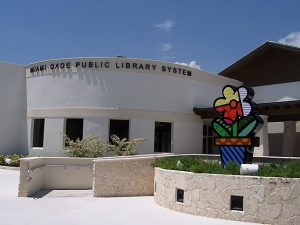 Additional (read: restored) hours at libraries and funding for more books and materials.
Additional (read: restored) hours at libraries and funding for more books and materials.- Funding for Ludlum Trail.
- Increased funding for community-based organizations and cultural programs.
- In-kind support and funding for the Super Bowl, Capital One Orange Bowl game, the National Championship Game in 2021, the Orange Blossom Classic and the Battle of the Bands.
- More than $260 million for both existing and new affordable housing projects. “More than 7,100 families will be provided with public housing each month,” Gimenez said.
- Continued funding for summer internship programs and Employ Miami-Dade.
- Continued funding for the Fit2Learn and Fit2Play programs in parks.
- $500,000 to address the seaweed on Miami Beach — which is gone already.
- Additional funds for the elections department to comply with state law that intends to improve electronic voter registration.
- Funding to ensure that the 2020 Census records the correct demographic information so we have the appropriate representation in Congress and get the right amount of federal funding.
- Money set aside for “flexibility” dealing with labor unions.
In addition, Gimenez said, a countywide infrastructure investment program has been developed “to renovate and repair our power systems, life safety systems, security, elevators and other improvements.” This is what Ladra previously referred to as his paint and spackle slush fund.
Read related: Miami-Dade budget: Mayor has money for his priorities, not ours
“Funding previously budgeted for emergency repairs will be used to pay for this program. This should drastically reduce the need to address critical system repairs as emergencies,” Gimenez said.
“This is a responsible budget.”
Pffffft.
It also includes funding to “complete the replacement of MetroRail cars and the purchase of electric buses and buses fueled by compressed natural gas,” as 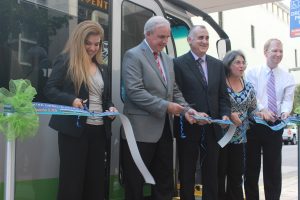 well as more for the synchronization of lights Gimenez said, although it seems we pay for those very same things every single year. This photo is a ribbon cutting on a new bus in 2016.
well as more for the synchronization of lights Gimenez said, although it seems we pay for those very same things every single year. This photo is a ribbon cutting on a new bus in 2016.
Gimenez also tried to put a new spin on the People’s Transportation Plan funds that the county has been misusing to subsidize transit operations. He now says that the maintenance fees were legitimate on some of the programs which were part of the 2002 half penny promises, like the free MetroMover and the Golden Passport giving seniors a free ride.
And he called the PTP “a comprehensive plan to improve mobility throughout 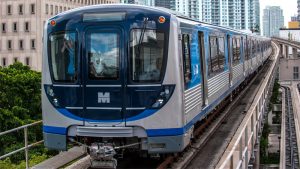 our community, not jut a plan to provide new rail corridors.”
our community, not jut a plan to provide new rail corridors.”
Gimenez said this is the first budget in which the general fund is “actually subsidizing the services approved by the voters as part of the original People’s Transportation Plan” by $5 million this year. He said that in 2022-23, the general fund will subsidize all of the transit project supported by the PTP.
“An effort to unwind the unification of the transit budget continues,” the mayor said. “While I did not support unification as a commissioner I know that without that action we would not be providing the transit service — both rail and bus — that we are providing today.
Read related: Carlos Gimenez taps commissioner to block return of half-penny funds
“We have spent enough tine discussing the false promises of the original People’s Transportation Plan in 2002,” in what seems a dig at former Mayor Alex Penelas, who is running for mayor in 2020. “Let’s move forward, support our transportation services, and make every effort to improve mobility in our community.
“Mobility patterns change, as do people’s habits. What was the best practice 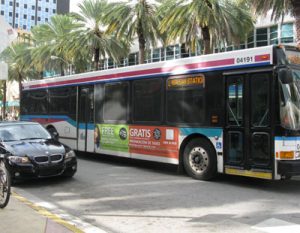 back when the PTP was originally approved may not be what makes sense now. We need to be agile to truly make a difference in our community.”
back when the PTP was originally approved may not be what makes sense now. We need to be agile to truly make a difference in our community.”
He sounded like he is laying the groundwork for his defense of more buses instead of rail to the south, north and west. Oh yeah, because he is.
“I recommend — and my staff is developing — an effort to develop a strategic planning model for the People’s Transportation Plan, with near term goals and objectives and the developmnt of measurable results so that we may regain the trust of our community.”
Mayor Gimenez, the only way to do that is give us the rail extensions we voted for in 2002. Mobility patterns and best practices have not changed so much that buses are better than rail 18 years later.
“I realize this budget isn’t perfect,” Gimenez said, adding that it could be tweaked between now and the second hearing on Sept. 19 to allocate more funds for identified projects and priorities.
“Miami-Dade County must continue to provide critical services to our residents, especially the elderly and young people, and this budget does just that.”
Apparently, it barely does just that — and little else.

